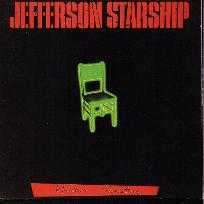| Professional ratings |
|---|
|
|
|
| Review scores |
| Source |
Rating |
| Allmusic |
     [1] [1] |
|
|
|
|
|
|
|
|
|
|
|
|
|
|
|
|
|
|
|
Nuclear Furniture is the final album release by the American rock band Jefferson Starship before it became Starship. It was released in 1984 and spawned the Top 40 single "No Way Out", which was also the first single by any incarnation of the band to hit #1 on the Mainstream Rock Tracks chart. The album itself reached #28. Produced by Ron Nevison, the album was arranged with the help of Peter Wolf, who had worked with Grace Slick on her solo album, Software. Wolf also contributed keyboard and synthesizer work to the album, although not an official part of the band. Peter Wolf (not the singer of the same name) and Ina Wolf also wrote the single "No Way Out", the first of many songs penned by the husband and wife duo that took "Starship" in a more commercial direction. As the album was being recorded, Paul Kantner became frustrated with the album's direction. Before the sessions came to a close, he stole the master tapes, put them in his car and drove around San Francisco for a few days and wouldn't bring them back until the band mixed the album in a way more to his liking.[2] Shortly after release of the album, Paul left the band, and he only appears in the first promotional video produced, "No Way Out." After the departure of Kantner the band lost the "Jefferson" moniker and morphed into Starship; there would not be another studio album released under the Jefferson Starship name until after Kantner reformed the band in 1992.
At least four of the tracks on Nuclear Furniture (namely "Connection", "Rose Goes to Yale", "Showdown" and "Champion") seem to tell a story about a nuclear war; the protagonist "Lightning Rose" was first mentioned in the song of that name on the 1979 album Freedom at Point Zero. The reference in "Showdown" to "Six minutes and the war is roaring" is a specific reference to the fact that it took six minutes for a sea-launched ballistic missile to impact on its target.
Track listing
|
|
| 1. |
"Rose Goes To Yale" | Kantner, Ronnie Gilbert | Kantner |
2:56 |
| 2. |
"Magician" | Grace Slick | P. Wolf |
3:23 |
| 3. |
"Assassin" | J. Sears | P. Sears |
3:52 |
| 4. |
"Shining In The Moonlight" | Chaquico, Thomas | Chaquico |
3:38 |
| 5. |
"Showdown" | Slick | Slick |
3:22 |
| 6. |
"Champion" | Kantner, Gilbert | Kantner |
4:40 |
Personnel
Additional Personnel
Production
- Jefferson Starship – arrangements
- Ron Nevison – producer, engineer, arrangements
- Peter Wolf – arrangements
- Maureen Droney – assistant engineer
- Kevin Eddy – assistant mixing engineer
- Mike Reese – mastering
- Pat Ieraci (Maurice) – production coordinator
- Rod Dyer, Clive Pierce / Dyer / Kahn, Inc. – cover design
- Tracks recorded at The Automatt, San Francisco
- Over-dubs and mixing at The Plant, Sausalito
- Mastered at The Mastering Lab, Hollywood
- Bill Thompson – manager
Singles / Music Videos
- "No Way Out" (1984)
- "Layin' It on the Line" (1984)
- "Sorry Me, Sorry You" (1984)
Charts
Album
| Year |
Chart |
Position |
|---|
| 1984 |
The Billboard 200 |
28 |
|
Singles
| Year |
Single |
Chart |
Position |
|---|
| 1984 |
"No Way Out" |
The Billboard Hot 100 |
23 |
| 1984 |
"Layin' It on the Line" |
The Billboard Hot 100 |
66 |
| 1984 |
"No Way Out" |
Mainstream Rock Tracks |
1 |
| 1984 |
"Layin' It on the Line" |
Mainstream Rock Tracks |
6 |
|
Notes
- ↑ Allmusic review
- ↑ Tamarakin, Jeff (2003). Got a Revolution: The Turbulent Flight of Jefferson Airplane. Simon and Schuster. ISBN 0-671-03403-0.
|
|---|
| | Studio albums |
Jefferson Airplane | |
|---|
| Jefferson Starship | |
|---|
| Starship | |
|---|
|
|---|
| | Live albums | |
|---|
| | Full live concerts |
- B.B. King's Blues Club
- Vinoy Park
- Post Nine 11
- UK
- Live
- Live in 2005
- Galactic Reunion Concert
- Mick's Picks
|
|---|
| | Authorized bootlegs | |
|---|
| | Compilations | |
|---|
| | Singles | |
|---|
| | Related articles | |
|---|
|
 Book Book Category Category
|
|
